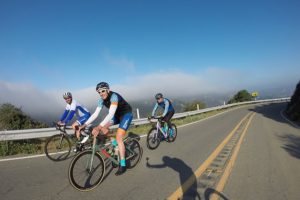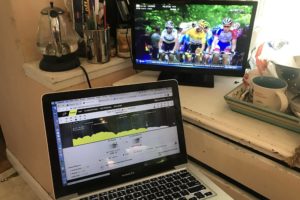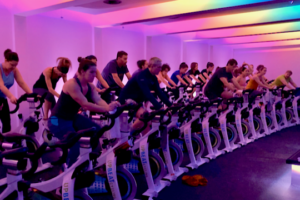Skills Matter as Much as Fitness
A Balanced Plan Focuses on All Four “Legs of the Stool”
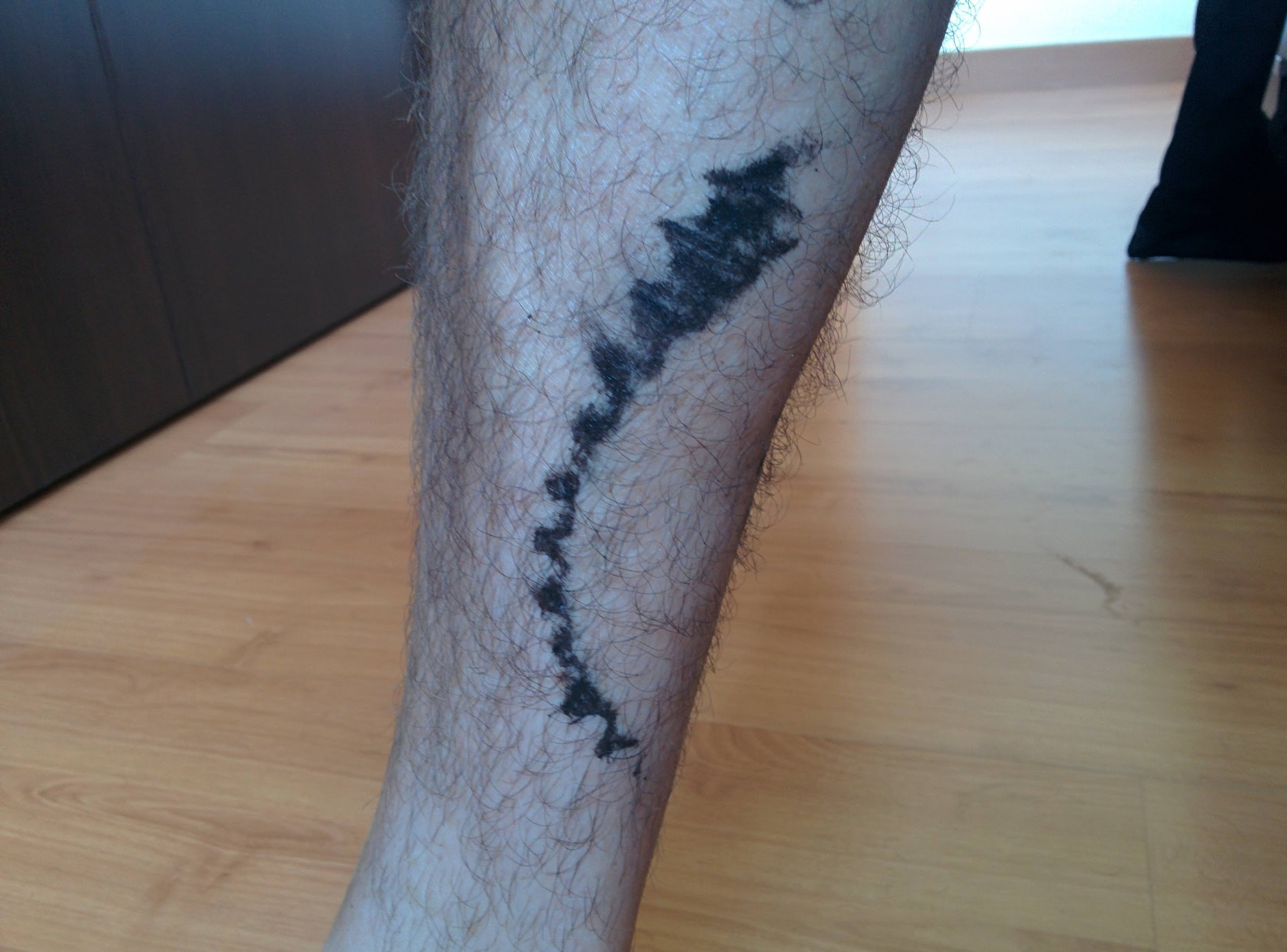
“I need to get in shape,” he said after being dropped repeatedly on this training ride.
I looked down to see the “Cat-5 Tattoo” on his right leg, a term to describe that greasy chainring mark associated with novices (a “Category 5” is a beginner racer).
I hear this lamentation about being “out of shape” from our riders that perennially struggle. Few of these folks ever achieve a fitness goal – be that performance, weight loss, appearance or simply a healthy outlook – that makes them an endurance cyclist.
The vast majority of charity cyclists fail at this largely because they believe the goal to be fitness first. They never focus on skills. Imagine an architect trying to build the Taj Mahal by only focusing on the elegant onion domes but not the foundation. But if we make the primary foundation of our plan to become a good all around cyclist, the fitness inevitably will follow.
Best Buddies sends a participant survey after each event. About 80 percent of the respondents state they do not need any help with our training rides. But, the 20 percent who take advantage of the rides report learning critically important skills. My observation of every Best Buddies Challenge ride is that 80 percent of the riders would benefit by taking some classes on basic cycling skills. While people take classes for golf, skiing and tennis, they somehow hope to learn about cycling by osmosis from some person in their family or office or circle of friends who probably taught themselves in the same way. They form flocks of ill-feathered birds who smash together for a charity ride once a year with – well – chaotic results.
We just completed a bicycle tour of Lexington and Concord, Massachusetts. We spent close to 3.5 hours on a 31-mile ride, a distance I knock out in just 90 minutes when in “training mode.” Stopping and starting, riding on a crowded bike path, making left turns in busy town centers, dismounting, re-mounting, navigating the boardwalks and sandy paths of the Battle Road in the Minuteman National Park. I left the heart rate monitor at home and rode in touring shorts and a t-shirt. I doubt my heart rate went above 120 beats per minute even on the few climbs we did.
That ride did a lot of good for me and the other riders who came.
The development of a good cyclist depends on a balanced approach between skills and fitness. I believe there to be four “legs of the stool”. While fitness is one of those four legs, it is the last one to master. The others are logistical skills, bike skills and tactical skills. Having Olympic-caliber fitness is of no use if you cannot find your shoes, you drop your chain on the climbs, and you get left behind at every intersection.
In short, if one of those legs is short you’ll have a wobbly stool.
Let me expand on each of the four, in the order in which I believe they should be tackled:
LOGISTICAL SKILLS
The most successful national cycling federation of the last decade is the British. Simon Burney, a Brit who serves as the mountain bike and cyclo-cross coordinator for the International Cycling Union, describes the screening phone call young riders receive from the national team coaches. They ask about where the rider keeps the backpack, where are the shoes, how they store their gear, when do they eat, how they manage school or work, what do they do after each ride, etc. Invariably the young athlete will ask a question: “What do you want me to do when I ride?”
“We don’t care,” is their response.
The legendary pro Bobby Julich taught me long ago of how pro teams drill their young riders to ensure they keep their vital equipment – shoes, helmet, etc. – in a backpack that they always keep at hand.
I get quizzed constantly about training regimens from people who cannot get their lives organized to ride. They become ensnared by issues with babysitters, bosses, spouses, weather, flat tires, car racks, missing clothing, etc. As a result they rarely ride, let alone train. The ability to get to a bike ride on time with all the clothing and equipment is the first thing to master. Look at all the organization required to own and operate an automobile. Now apply that focus to owning and operating a bicycle.
Surprisingly, it’s the first barrier to success.
BIKE SKILLS
Typically we encounter new riders unable to clip into the pedals, with grease all over their right leg, in the wrong gear, and poorly fit to their bike… and that’s in the parking lot! The ability to properly shift, safely use the brakes, hit a pothole without crashing, climb, descend and corner is a start. And then there is the ability to drink from a water bottle, eat, and change clothing all while riding.
We find too many riders who simply ride over and over on the same course without ever practicing skills. I developed a lot of skills riding inside my freshman dormitory (to the chagrin of my residential assistant). Too many riders only ride with Lycra and a jersey but never roll to the store, carry home groceries, cut across a park, hop a curb, ride off a curb, or simply practice rolling around in the driveway really, really, really slowly. Utility cycling, with all of its starts and stops, is fantastic.
Watch kids on BMX bikes. They goof off. And so should you. Yes, you can take your road bike into a skate park, onto the pump track, a dirt road, or a modest trail.
All of this makes cycling a joyful endeavor and not some treadmill drudgery.
TACTICAL SKILLS
While bike skills pertain to you and your bike, tactical skills are about how well you ride within a group of cyclists. Far too many charity cyclists only ride alone or – even worse – on an indoor trainer before they show up on the open roads with a large group.
Moving with safety and courtesy with a group is rarely mastered, even by riders with 20-plus years experience. They swarm at intersections, dart out into traffic alone without concern for the group, ride three- or four-wide, repeatedly surge ahead and commit untold sins that real pros refuse to tolerate.
Mastery of drafting transforms cycling from an arduous “workout” to a blissful “flow” experience. And that opens the door to a variety of tactical ways to ride faster and farther than you ever could alone. I came to realize however that mastery of these skills is extremely challenging for beginners. They get left behind at every transition – a turn, an intersection, a crosswind, a climb, a descent, a surge in speed, or any combination thereof – despite having sufficient fitness. Recognizing and closing a small gap early is a learned art. The simple mantra “a stitch in time saves nine” applies to cycling in a group. Moving smoothly within that pincushion of elbows, handlebars and hips requires practice. The ability to see and anticipate the movements of this organism that we call the peloton is sublime.
This is what we teach on our group rides most of our riders insist they don’t need.
FITNESS
With the above elements checked off, you can then ride for fitness. Note that this is the final leg of the stool. Mastering the above elements can be done without much emphasis on intensity, performance or such metrics as watts or heart rate. Riding with a good group will make the most notable difference and provide a gauge of your developing fitness amongst peers. Using an app such as Strava can provide you with a lot of great data while also introducing you to other cyclists in your area. If you stick with it, the fitness and speed will go up and the weight and riding times will come down. Eventually you will hit a fitness plateau when you need to consider nutrition, core work, hydration, rest, flexibility, such terms as HIIT, threshold work, sweet spot training, LSB and assorted means of gaining granular progress. And that is when you may consider a professional coach and getting on a structured training plan.
But don’t skip over the mastery of those important first three skills.
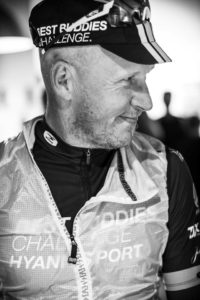 Richard Fries is the Director of Cycling Experience for the Best Buddies Challenges. With more than 40 years experience, he has been a racer, commuter, tourist, promoter, advocate, journalist and commentator on the sport and lifestyle of cycling. Having raced at the professional level both in America and Europe, Fries is well known as a race announcer having called countless USA Cycling National Championships, World Cups, and UCI World Championships. But he is also a tireless advocate having recently served as the executive director of MassBike. You can follow him on Strava to learn more.
Richard Fries is the Director of Cycling Experience for the Best Buddies Challenges. With more than 40 years experience, he has been a racer, commuter, tourist, promoter, advocate, journalist and commentator on the sport and lifestyle of cycling. Having raced at the professional level both in America and Europe, Fries is well known as a race announcer having called countless USA Cycling National Championships, World Cups, and UCI World Championships. But he is also a tireless advocate having recently served as the executive director of MassBike. You can follow him on Strava to learn more.

